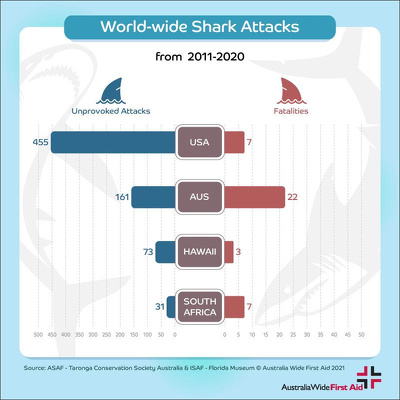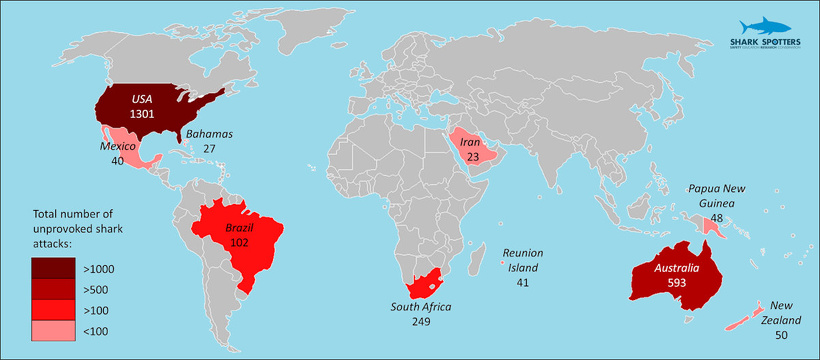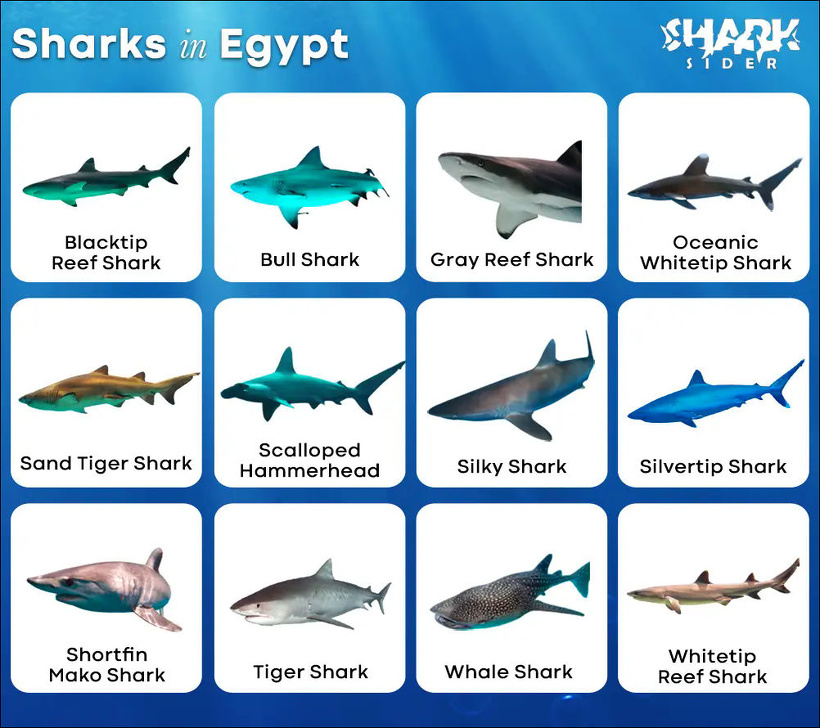Home | Category: Humans, Sharks and Shark Attacks
SHARK ATTACKS BY REGION
About half of the world’s shark attacks are in the United States with a third of the world’s attack in Florida. In 2007 there were 50 shark attacks in the United States, compared to 13 in Australia. None were fatal. In the U.S., there is one shark fatality on average every two years. (More people die at the beach getting buried in holes they dig in the sand.) Sharks killed only five Americans from 1959 to 1990. Because Australia has bigger sharks that attack humans it has a higher fatality rate. Between 1990 and 2007 there were 19 fatal shark attacks in Australia compared to four in Florida.
Shark strikes in U.S. waters were slightly up in the summer of 2011, with 7 each in May and June, and 3 in July. The number of shark attacks in the United States declined to 28 in 2009 from 41 in 2008, according to a University of Florida report. George Burgess, curator of the International Shark Attack File at the university, said there were 61 attacks worldwide in 2009 and 60 in 2008. The United Stated led the world in the number of attacks,, followed by Australia, with 20, and South Africa, with 6. The number of attacks in the United States has fallen in each of the past three years, Mr. Burgess said. (AP)
In 2001, 82 percent of reported shark attacks occurred in North American waters, including 55 off the U.S., four in the Bahamas, two off Mexico and one off Cuba. Elsewhere, attacks occurred in South Africa (5), Australia (7), Brazil (3), Bahamas (four), Reunion Island (4), New Guinea (2), Tanzania (2), the Cape Verde Islands (1), the Marshall Islands (1), Mozambique (1), and New Zealand (1). In 2000 there were 11 deaths: three deaths were reported from Australia, two from Tanzania and one each in Fiji, Japan, New Caledonia, New Guinea and the United States.
In 1997 there were 34 shark attacks in United States; 5 in Australia; 4 in Brazil; 3 each in the Bahamas and South Africa; 2 each in Japan and New Guinea; and 1 each in Mexico, Fiji, Reunion Island and Vanuatu. In 1996 six shark attacks were fatal — two in Brazil and one each in Florida, South Africa, Australia and Mozambique. The big news was that South Africa had so many attacks. It had 17 shark attacks, compared to a yearly average of five over the past decade. Burgess said there were no reports of unusual oceanographic conditions, except for greater numbers of sardines, which could attract more sharks.
A number of attacks have occurred off the Brazilian port of Recife. In August 2011, two people were killed in the Seychelles and two were maimed in eastern Russia, causing panic and closing beaches in both places.
Related Articles: SHARK ATTACKS: FATALITIES, WHERE AND SPECIES ioa.factsanddetails.com ; HISTORY OF HUMAN SHARK ATTACKS: ANCIENT PEOPLE, JAWS AND THE INDIANAPOLIS ioa.factsanddetails.com ; SHARK ATTACKS VICTIMS AND REASONS WHY ATTACKS OCCUR ioa.factsanddetails.com ; AVOIDING SHARKS, PROTECTION FROM THEM AND ANTI-SHARK TECHNOLOGY ioa.factsanddetails.com ; SHARK ATTACKS BY DIFFERENT SPECIES ioa.factsanddetails.com ; SHARK TOURISM AND SWIMMING WITH SHARKS ioa.factsanddetails.com ; SHARKS AND RAYS ioa.factsanddetails.com; HUMANS, SHARKS AND SHARK ATTACKS ioa.factsanddetails.com; SHARKS: CHARACTERISTICS, SENSES AND MOVEMENT ioa.factsanddetails.com ; SHARK BEHAVIOR: INTELLIGENCE, SLEEP AND WHERE THEY HANG OUT ioa.factsanddetails.com ; SHARK FEEDING: PREY, HUNTING TECHNIQUES AND FRENZIES ioa.factsanddetails.com
See Great White Sharks, Bull Sharks, Tiger Sharks and Grey Reef Sharks.
Websites and Resources: Shark Foundation shark.swiss ; International Shark Attack Files, Florida Museum of Natural History, University of Florida floridamuseum.ufl.edu/shark-attacks ; Tracking Sharks trackingsharks.com, which records all global shark attacks; Animal Diversity Web (ADW) animaldiversity.org; National Oceanic and Atmospheric Administration (NOAA) noaa.gov; Fishbase fishbase.se ; Encyclopedia of Life eol.org ; Smithsonian Oceans Portal ocean.si.edu/ocean-life-ecosystems
Countries with the Most Shark Attacks
In the United States there has been a total of 1657 unprovoked shark attacks, with non-fatal and unprovoked attacks numbering 1513 and fatal and unprovoked ones being 144. [Source: Global Shark Attack File (GSAF), compiled by the Shark Research Institute, sharkattackdata.com, 2016]
In Australia there has been a total of 904 unprovoked shark attacks, with non-fatal and unprovoked attacks numbering 645 and fatal and unprovoked ones being 259.
In South Africa there has been a total of 395 unprovoked shark attacks, with non-fatal and unprovoked attacks numbering 299 and fatal and unprovoked ones being 96.
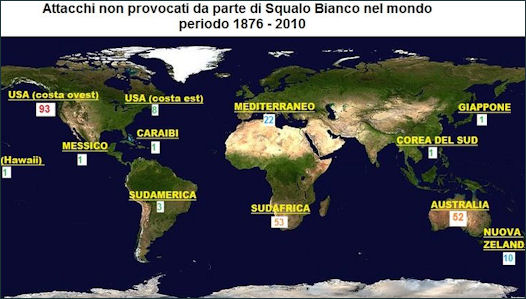
Shark deaths between 1876 and 2010
Shark Attacks in 2022
Country — Total — Fatal
U.S. — 41 — 1
Australia — 9 — 0
Egypt — 2 — 2
South Africa — 2 — 2
Brazil — 1 — 0
New Zealand — 1 — 0
Thailand — 1 — 0
Worldwide — 57 — 5
[Source: Shark Files, Florida Museum of Natural History]
In Papua New Guinea there has been a total of 118 unprovoked shark attacks, with non-fatal and unprovoked attacks numbering 63 and fatal and unprovoked ones being 55.
In Brazil there has been a total of 86 unprovoked shark attacks, with non-fatal and unprovoked attacks numbering 56 and fatal and unprovoked ones being 30.
See Separate Articles SHARK ATTACKS IN THE UNITED STATES ioa.factsanddetails.com ; SHARK ATTACKS IN AUSTRALIA ioa.factsanddetails.com ; Great White Shark and Shark Attacks in South Africa ioa.factsanddetails.com REUNION ISLAND — DEADLY SHARK ATTACK CAPITAL OF THE WORLD? ioa.factsanddetails.com ; SHARK ATTACKS IN THE RECIFE AREA OF BRAZIL ioa.factsanddetails.com ; SHARK ATTACKS IN HAWAII ioa.factsanddetails.com
Long-Distance Rowers Attacked by a Shark in the Middle of the Atlantic
In 2005, two New Zealand rowers, Tara Remington and Iain Rudkin, endured a prolonged shark attack to the their seven-meter-long boat in the middle of the Atlantic Ocean about 600 nautical miles into the 2935-nautical-mile transatlantic race from the Canary Islands to Antigua. [Source: Julie Ash, New Zealand Herald, December 20, 2005]
The New Zealand reported: The team's shore manager, Rob Hamill, said they were anchored at the time because strong head winds had made it impossible to row. "They saw the shark go under the boat, it circled a couple of times then just went for it," said Hamill. "It wasn't just a one-off attack. It kept launching into it." Remington and Rudkin dived into the cabin, tried to remain as quiet and still as possible and sat out the attack, which ended after 15 minutes. "It was so aggressive and persistent, for a while we wondered if it would ever stop. It just kept hitting the boat, having a go at the rudder, the sea anchor and hull," Remington wrote on the team's website "We weren't sure it wasn't biting holes in the underside so we rang the support ship Aurora for advice and possible assistance."
Hamill said the pair estimated the shark was about 3 meters to 3.5 meters long. "The boat is 6ft [1.8 meters] wide and they could see it out either side as it went under the boat. "Iain said, kind of jokingly, that he was considering taping the gas canister to a flare and doing a Jaws [reference to a scene in the Jaws movie when a gas canister was used to blow up a shark]. "If the attack had carried on for too much longer they would seriously have had to have thought about doing something."
The support vessel arrived six hours later and planned to remain alongside Remington and Rudkin until morning to check the race boat for damage. "The scary thing is I was in the water cleaning the hull for barnacles at exactly the same time [on Monday] and Iain did likewise the day before," Remington said. "I haven't bitten my nails for over a year now, but in that time I chewed two nails right off." Hamill, who has won the race three times, said he had never heard of such an attack happening before.
The boats were designed to self-right, so if the craft had flipped during the attack, Remington and Rudkin would have been safe in the cabin. However, if the shark had smashed through the hull, causing the craft to sink, it would have been a different story. Hamill said the determined duo, although clearly shaken by the attack, had no plans to quit the race.
Shark Attacks in the Russian Far East
In 2011 Michael Schwirtz wrote in the New York Times, “When a young man lost both his arms in the waters off Russia’s east coast, officials and residents initially had trouble believing what had happened. But a day later, when a teenager’s legs were ripped up in the same waters, all doubt vanished. In a region more accustomed to threats from bears, the culprit appears to be a man-eating shark — possibly more than one. [Source: Michael Schwirtz, New York Times, August 18, 2011]
The authorities have temporarily banned swimming at several beaches in the area, coastal Primorsky Krai, along the Sea of Japan. It was unclear what type of shark attacked in either case, though witnesses and some scientists were leaning toward a great white. Large sharks have been sighted in the region only rarely, scientists said, and attacks until now were unheard of. “They said it was a shark, but I didn’t believe it,” said Andrei Tarasov, who witnessed the first attack and was interviewed by Russia’s Vesti television. “I thought they were mistaken until I saw the guy who was attacked. Then there was no doubt.”
The first victim, a 25-year-old computer programmer, had been out for an evening swim with his wife at a popular vacation spot near Russia’s border with North Korea. The two, Denis and Polina Udovenko, were aiming for a small rock formation known locally as Yearning Heart Island. “It was only about 300 feet,” Ms. Udovenko said, according to the Interfax news agency. “About halfway there, Denis noticed something in the water and screamed, “Swim faster, it’s a shark.” “He beat it on the nose, and it heaved him up and then down,” she said. “Then the shark threw him to the surface.”They were hauled in by boaters. Mr. Udovenko lost a considerable amount of blood and both arms below the elbow, but he survived, the Health Ministry said in a statement.
The second victim, Valery Sidorovich, 16, was attacked about 30 miles away. Video images of his rescue that were broadcast on Russian television showed him being taken from a boat on a stretcher, his legs swaddled in bloody bandages. Later, the Russian news media reported a third attack, citing local residents, though officials did not immediately confirm it.
Dmitri Pilipchak, a spokesman for the local branch of the Emergency Situations Ministry, said that there had not been one recorded case of a shark attack in the region until now. “These are the first,” he said. In fact, some scientists said they were probably the first in Russian waters in recent history. Witnesses gave varying descriptions of the shark, putting its size at 6 to 12 feet long. After reviewing the accounts, several scientists said they believed it was probably a great white. Smaller sharks, like the salmon shark and the spiny dogfish, are commonly found in the Sea of Japan, but they do not typically attack humans, said Konstantin Zgurovsky, the marine program coordinator for the Russian branch of the World Wildlife Fund. Another draw for a great white might be water temperature. The waters in the region have been several degrees higher than normal, making a more attractive environment for great whites, according to Mr. Zgurovsky.
While great whites have a very large range and are found all over the globe , they have rarely been sighted in the Sea of Japan, said Dmitri Astakhov, a shark expert at the P.P. Shirshov Institute of Marine Sciences in Moscow. That body of water is home to seals and other shark prey, but not in sufficient densities to sustain large sharks. A hungry great white, lacking its typical prey, Dr. Astakhov said, “could certainly have attacked a human.” (For the same reason, overfishing is often blamed for increasing the likelihood of attacks on humans around the world.) Russians’ blasé attitude toward danger is a source of national pride, and despite the ban on swimming, local news media reported that beachgoers continued to take to the water.The local branch of the Emergency Situations Ministry, perhaps expecting that many would flout the ban, posted a shark attack survival guide on its Web site. “If a shark tries to attack you, fight it off; try to hit it in the eyes and gills,” read one advisory. “Remember,” read another, “panic could lead to tragic results.”
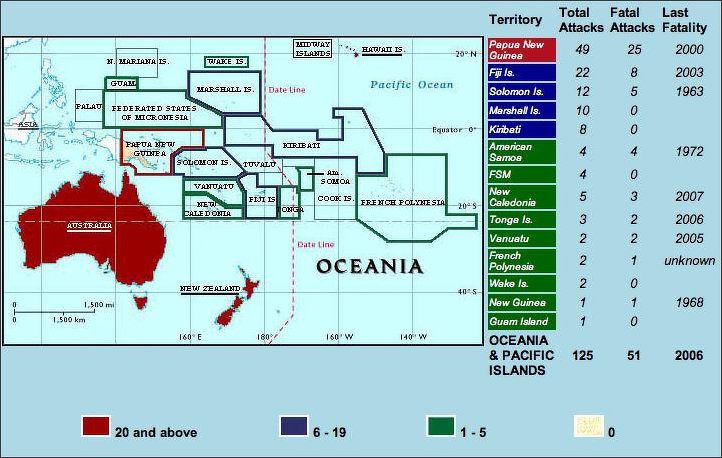
shark attacks in the South Pacific as of 2007
SHARK ATTACKS IN THE PACIFIC
Papua New Guinea: 118 unprovoked shark attacks, with 63 non-fatal attacks and 55 fatal attacks.
New Zealand: 79 unprovoked shark attacks, with 55 non-fatal attacks and 24 fatal attacks.
Fiji: 58 unprovoked shark attacks, with 36 non-fatal attacks and 22 fatal attacks.
New Caledonia: 46 unprovoked shark attacks, with 31 non-fatal attacks and 15 fatal attacks.
Solomon Islands: 20 unprovoked shark attacks, with 12 non-fatal attacks and eight fatal attacks.
French Polynesia: 18 unprovoked shark attacks, with 16 non-fatal attacks and two fatal attacks.
Vanuatu : 12 unprovoked shark attacks, with three non-fatal attacks and nine fatal attacks.
[Source: Global Shark Attack File (GSAF), compiled by the Shark Research Institute, sharkattackdata.com, 2016]
Tonga: 12 unprovoked shark attacks, with eight non-fatal attacks and four fatal attacks.
Marshall Islands: 11 unprovoked shark attacks, with nine non-fatal attacks and two fatal attacks.
Samoa: six unprovoked shark attacks, with four non-fatal attacks and two fatal attacks.
Micronesia: four unprovoked shark attacks, with four non-fatal attacks and zero fatal attacks.
See Separate Article SHARK ATTACKS IN THE PACIFIC ioa.factsanddetails.com
SHARK ATTACKS IN ASIA
India: 34 unprovoked shark attacks, with 19 non-fatal attacks and 15 fatal attacks.
Philippines: 30 unprovoked shark attacks, with 15 non-fatal attacks and 15 fatal attacks.
Japan : 27 unprovoked shark attacks, with 12 non-fatal attacks and 15 fatal attacks.
China : 27 unprovoked shark attacks, with 11 non-fatal attacks and 16 fatal attacks.
Indonesia: 14 unprovoked shark attacks, with six non-fatal attacks and eight fatal attacks.
Vietnam: 12 unprovoked shark attacks, with 12 non-fatal attacks and zero fatal attacks.
Sri Lanka: 11 unprovoked shark attacks, with nine non-fatal attacks and two fatal attacks.
[Source: Global Shark Attack File (GSAF), compiled by the Shark Research Institute, sharkattackdata.com, 2016]
South Korea: eight unprovoked shark attacks, with two non-fatal attacks and six fatal attacks.
Taiwan: six unprovoked shark attacks, with four non-fatal attacks and two fatal attacks.
Singapore: six unprovoked shark attacks, with two non-fatal attacks and four fatal attacks.
Thailand: five unprovoked shark attacks, with three non-fatal attacks and two fatal attacks.
Russia: four unprovoked shark attacks, with four non-fatal attacks and zero fatal attacks.
Malaysia: three unprovoked shark attacks, with three non-fatal attacks and zero fatal attacks.
Burma: three unprovoked shark attacks, with one non-fatal attack and two fatal attacks.
Korea: one unprovoked shark attack, with zero non-fatal attacks and one fatal attack.
Bangladesh: zero unprovoked shark attacks.
Maldives: zero unprovoked shark attacks.
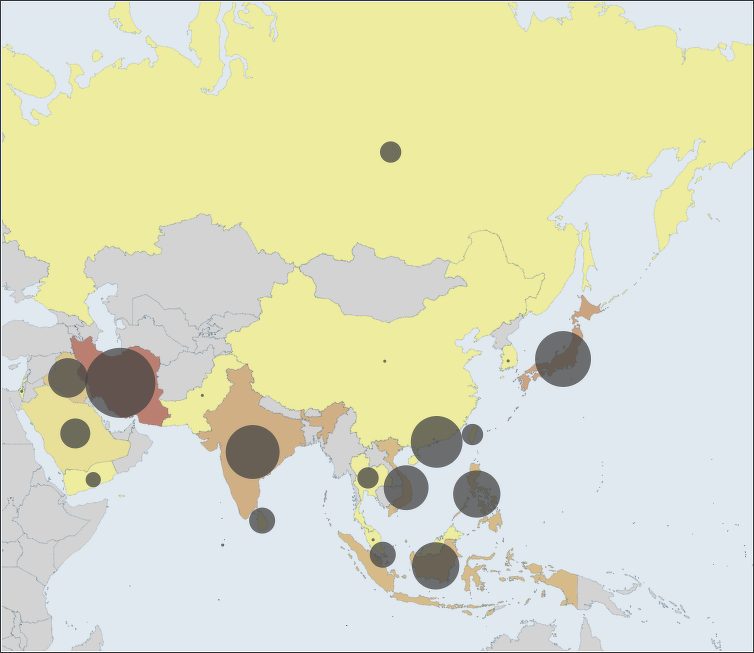
Shark attacks in Asia
Shark Attacks in Japan
Shark attacks in 1997: 34 in United States; 5 in Australia; 4 in Brazil; 3 each in the Bahamas and South Africa; 2 each in Japan and New Guinea; 1 in Mexico, Fiji, Reunion Island and Vanuatu. Ama divers carry small wooden amulets with them when ever they dive for protection against sharks.
The last reports of a fatal shark attack in Japan was in 1992 when a man fishing in the Inland Sea off Matsuyama on Shikoku was killed by a great white shark.
In the summer of 2007, large numbers of hammerhead sharks were spotted close to beaches in Fukuoka and Shizuoka Prefectures. A school with several hundred hammerheads was spotted in waters between 200 meters and 500 meters from the beach in Koga, Fukuoka Prefecture, in northern Kyushu. Two hammerheads over 3.5 meters were seen at Usami beach in Ito, Shizuoka Prefecture. These sharks usually spend their time out at sea. The presence of the sharks so close to shore was attributed to the diversion of a warm currents close to the coast.
Beaches on the Sea of Japan were closed in the summer of 2001 when large numbers of hammerhead sharks were spotted near the shore. There are nine species of hammerhead, with smooth and scalloped hammerheads being the ones most often spotted in Japanese waters. These are often seen several kilometers off the coast of Japan following warm currents north during the summer.
SHARK ATTACKS IN THE RED SEA
According to the International Shark Attack File, Egypt has had only 18 shark attacks between 1828 to Feb. 17, 2016. But while shark sightings in this country are rare, the attacks involving sharks are memorable, as the Daily News Egypt reported. In 2009, a French woman was killed in a shark attack at the resort of Sharm El-Sheikh. In 2010, a German tourist was killed by a shark, and three Russian tourists were injured in other attacks. In 2015, a 53-year-old German was swimming at a resort in Marsa Alam when he was killed in a shark attack. "All of the attacks in the Red Sea in the last decade were carried out on swimmers and snorkelers, not divers," Mahmoud Hanafy, a marine biologist at Suez Canal University, told Mada Masr. "The shark, when it sees something moving on the surface, bites it to see if it is food or not." [Source: Men's Journal, December 5, 2019]
Egypt: 34 unprovoked shark attacks, with 25 non-fatal attacks and nine fatal attacks.
Yemen: seven unprovoked shark attacks, with one non-fatal attack and six fatal attacks.
Saudi Arabia: four unprovoked shark attacks, with three non-fatal attacks and one fatal attack.
Sudan: two unprovoked shark attacks, with two non-fatal attacks and zero fatal attacks.
Djibouti: one unprovoked shark attack, with zero non-fatal attacks and one fatal attack. [Source: Global Shark Attack File (GSAF), compiled by the Shark Research Institute, sharkattackdata.com, 2016]
See Separate Article SHARK ATTACKS IN THE RED SEA ioa.factsanddetails.com
SHARK ATTACKS OFF OF AFRICA
Shark Attacks off of East Africa
Reunion: 55 unprovoked shark attacks, with 29 non-fatal attacks and 26 fatal attacks.
Mozambique: 37 unprovoked shark attacks, with 21 non-fatal attacks and 16 fatal attacks.
Seychelles: unprovoked shark attacks, with three non-fatal attacks and four fatal attacks.
Kenya: unprovoked shark attacks, with three non-fatal attacks and seven fatal attacks.
Tanzania: six unprovoked shark attacks, with one non-fatal attack and five fatal attacks.
Madagascar: five unprovoked shark attacks, with two non-fatal attacks and three fatal attacks.
Somalia: four unprovoked shark attacks, with zero non-fatal attacks and four fatal attacks.
Mauritius: four unprovoked shark attacks, with four non-fatal attacks and zero fatal attacks.
British Indian Ocean Territory (Chagos Islands): one unprovoked shark attack, with zero non-fatal attacks and one fatal attack.
[Source: Global Shark Attack File (GSAF), compiled by the Shark Research Institute, sharkattackdata.com, 2016]
Shark Attacks off of West Africa
Sierra Leone: unprovoked shark attacks, with four non-fatal attacks and three fatal attacks.
Senegal: six unprovoked shark attacks, with four non-fatal attacks and two fatal attacks.
Nigeria: four unprovoked shark attacks, with one non-fatal attack and three fatal attacks.
Liberia: 2unprovoked shark attacks, with zero non-fatal attacks and two fatal attacks.
Guinea: two unprovoked shark attacks, with zero non-fatal attacks and two fatal attacks.
Equatorial Guinea: one unprovoked shark attack, with zero non-fatal attacks and one fatal attack.
Cape Verde: one unprovoked shark attack, with zero non-fatal attacks and one fatal attack.
Namibia: one unprovoked shark attack, with zero non-fatal attacks and one fatal attack.
St Helena: one unprovoked shark attack, with zero non-fatal attacks and one fatal attack.
Ghana: one unprovoked shark attack, with zero non-fatal attacks and one fatal attack.
Gabon: one unprovoked shark attack, with zero non-fatal attacks and one fatal attack.
Angola: one unprovoked shark attack, with one non-fatal attack and zero fatal attacks.
Shark Kills Man on Honeymoon in Front of His Wife in Seychelles
In August 2011, AFP reported: “A shark savaged a British tourist as his newlywed wife watched from the beach in the Seychelles, the second holidaymaker to die in such an attack this month, police said on Wednesday. The tourist was hauled onto a boat and taken to shore following the attack but died from blood loss after the shark ripped off his arm and tore into his leg, police said. [Source: AFP, August 18, 2011]
"Ian Redmond, a 30-year old British man, was on honeymoon with his wife when he was attacked by a shark while diving at Anse Lazio," a police statement said. "The shark tore off his arm and bit a part of his left leg," it added. His wife was on the beach - a famous beauty spot hailed for its white sand on the archipelago's Praslin island - and watched helplessly as her husband was mauled by the shark. "Two people who were on a boat not far from the attack tried to rescue him," the statement added.
The Seychelles Maritime Safety Authority issued a swimming ban at the Anse Lazio and Anse Georgette beaches, while surveillance patrols launched a hunt for the killer shark. "Fishermen will be undertaking continuous patrols , research and fishing activities in order to capture the shark," the maritime authority said in a statement. It said it would also reinforce a ban of "dumping of waste from yachts and other boats, which have been reported in some of these areas ," which some fear could have attracted sharks.
According to Sky News, Houghton was on the beach as Redmond snorkeled 20 yards from shore, when a six-foot shark attacked him. The Daily Mail reports that beachgoers heard cries for help, and a vacationer in a small boat pulled Redmond in and took him to shore. An American tourist told the news organization that someone saw a fin sticking out above the water. According to the tourist, a woman then ran over, screaming, "That’s my husband! We were just married."
Chantal Andre, a nearby restaurant employee who reportedly accompanied the wife to the hospital, told the Daily Mail that Houghton seemed to be "in total shock." The Evening Standard reports that the couple married in an "idyllic" wedding and were on the second week of their honeymoon. They have known each other for eight years, and have spent the past two preparing to move into a cottage together. Redmond's father, Stephen, told the Standard, "It's devastating. The last time we saw them they were so happy."
A shark attacked another man in the same area earlier this month, and the area's director for tourism is questioning whether it is the same "rogue shark," according to the Daily Mail. Michel Gardette, a Praslin development official told the news source, "I have been diving for the last 40 years and I have never encountered any problems. Sharks are actually very rare because they are hunted for their meat and fins."
SHARK ATTACKS IN THE CARIBBEAN
Between 2000 and 2019, there were 34 unprovoked shark bites in the Caribbean region, four of which have been fatal, he said. The majority of shark attacks in the Caribbean have occurred in the Bahamas, with two reported in 2019, one of them fatal. A shark attack also was reported in Cuba in 2019, according to the Florida-based International Shark Attack File. [Source: Dánica Coto, Associated Press, December 11, 2020]
The most common shark species around the Caribbean islands are reef sharks and nurse sharks, which usually don't pose much of a a risk Tiger sharks and bull sharks occasionally appear. Florida Shark researcher Director Gavin Naylor told the AP that most attacks in the Caribbean occur in the Bahamas because of its massive tourism. “We see a very strong correlation between shark bites and the number of people in the water,” he said.
Bahamas: 74 unprovoked shark attacks, with 67 non-fatal attacks and seven.
Cuba : 28 unprovoked shark attacks, with 12 non-fatal attacks and 16 fatal attacks.
Jamaica: 18 unprovoked shark attacks, with eight non-fatal attacks and 10 fatal attacks.
Bermuda: seven unprovoked shark attacks, with six non-fatal attacks and one fatal attack.
Barbados: four unprovoked shark attacks, with two non-fatal attacks and two fatal attacks.
Dominican Republic: four unprovoked shark attacks, with two non-fatal attacks and two fatal attacks.
Grenada: four unprovoked shark attacks, with one non-fatal attack and three fatal attacks.
[Source: Global Shark Attack File (GSAF), compiled by the Shark Research Institute, sharkattackdata.com, 2016]
See Separate Article SHARK ATTACKS IN THE CARIBBEAN ioa.factsanddetails.com

Shark Attack hotspots in Europe
SHARK ATTACKS IN THE MEDITERRANEAN, MIDDLE EAST, EUROPE AND LATIN AMERICA
Shark Attacks in Latin America
Brazil: 86 unprovoked shark attacks, with 56 non-fatal attacks and 30 fatal attacks.
Mexico: 62 unprovoked shark attacks, with 27 non-fatal attacks and 35 fatal attacks.
Panama: 27 unprovoked shark attacks, with 10 non-fatal attacks and 17 fatal attacks.
Venezuela: 11 unprovoked shark attacks, with11 Non-fatal and unprovoked six non-fatal attacks and five fatal attacks.
Costa Rica: 10 unprovoked shark attacks, with four non-fatal attacks and six fatal attacks.
Colombia : unprovoked shark attacks, with six non-fatal attacks and two fatal attacks.
Ecuador: unprovoked shark attacks, with eight non-fatal attacks and zero fatal attacks.
Chile: seven unprovoked shark attacks, with three non-fatal attacks and four fatal attacks.
Nicaragua: six unprovoked shark attacks, with two non-fatal attacks and four fatal attacks.
Uruguay: three unprovoked shark attacks, with two non-fatal attacks and one fatal attack.
El Salvador: two unprovoked shark attacks, with one non-fatal attack and one fatal attack.
Argentina: one unprovoked shark attack, with one non-fatal attack and zero fatal attacks.
Falkland Islands/Malvinas: one unprovoked shark attack, with one non-fatal attack and zero fatal attacks.
Paraguay: one unprovoked shark attack, with zero non-fatal attacks and one fatal attack.
[Source: Global Shark Attack File (GSAF), compiled by the Shark Research Institute, sharkattackdata.com, 2016]
Shark Attacks in the Middle East
Iran: 28 unprovoked shark attacks, with 15 non-fatal attacks and 13 fatal attacks. [Source: Global Shark Attack File (GSAF), compiled by the Shark Research Institute, sharkattackdata.com, 2016]
Iraq : 12 unprovoked shark attacks, with nine non-fatal attacks and three fatal attacks.
United Arab Emirates: one unprovoked shark attack, with one non-fatal attack and zero fatal attacks.
Bahrain: one unprovoked shark attack, with zero non-fatal attacks and one fatal attack.
Kuwait: one unprovoked shark attack, with one non-fatal attack and zero fatal attacks.
Shark Attacks in the Mediterranean
Italy: 26 unprovoked shark attacks, with 16 non-fatal attacks and 10 fatal attacks.
Spain: unprovoked 25 shark attacks, with 17 non-fatal attacks and eight fatal attacks.
Croatia: 21 unprovoked shark attacks, with seven non-fatal attacks and 14 fatal attacks.
Greece: 19 unprovoked shark attacks, with four non-fatal attacks and 15 fatal attacks.
France: unprovoked shark attacks, with seven non-fatal attacks and one fatal attack.
Libya: five unprovoked shark attacks, with three non-fatal attacks and two fatal attacks.
Turkey: four unprovoked shark attacks, with two non-fatal attacks and two fatal attacks.
Tunisia: three unprovoked shark attacks, with two non-fatal attacks and one fatal attack.
Israel: three unprovoked shark attacks, with three non-fatal attacks and zero fatal attacks.
Malta: three unprovoked shark attacks, with one non-fatal attack and two fatal attacks.
Lebanon: four unprovoked shark attacks, with one non-fatal attack and two fatal attacks.
Cyprus: one unprovoked shark attack, with zero non-fatal attacks and one fatal attack.
Algeria: one unprovoked shark attack, with zero non-fatal attacks and one fatal attack.
Montenegro: one unprovoked shark attack, with zero non-fatal attacks and one fatal attack.
Monaco: one unprovoked shark attack, with zero non-fatal attacks and one fatal attack.
Syria: zero unprovoked shark attacks.
Portugal: zero unprovoked shark attacks.
Slovenia: zero unprovoked shark attacks.
Shark Attacks in Northern Europe
United Kingdom: 16 unprovoked shark attacks, with 15 non-fatal attacks and one fatal attack.
Sweden: one unprovoked shark attack, with one non-fatal attack and zero fatal attacks.
Norway: zero unprovoked shark attacks.
Greenland: zero unprovoked shark attacks.
Ireland: zero unprovoked shark attacks.
Iceland: zero unprovoked shark attacks.
Image Sources: National Oceanic and Atmospheric Administration (NOAA); Wikimedia Commons, International Shark Attack File, South African Shark Spotters, Australia First Aid, Natal government, Queensland government, New South Wales government and West Australia government
Text Sources: Shark Files, Florida Museum of Natural History, Global Shark Attack File (GSAF), National Geographic, New York Times, Washington Post, Los Angeles Times, Smithsonian magazine, Natural History magazine, Discover magazine, The New Yorker, Time, Newsweek, Reuters, AP, AFP, Lonely Planet Guides and various books and other publications.
Last updated March 2023

